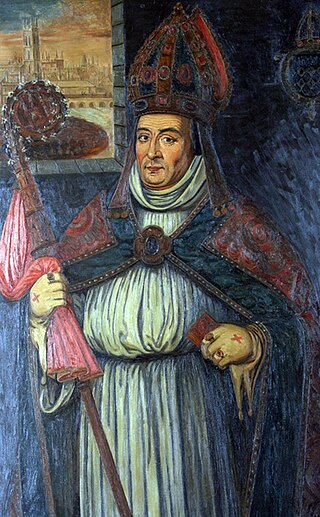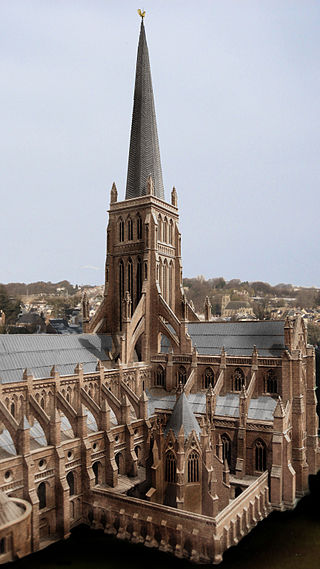Related Research Articles

William Waynflete, born William Patten, was Headmaster of Winchester College (1429–1441), Provost of Eton College (1442–1447), Bishop of Winchester (1447–1486) and Lord Chancellor of England (1456–1460). He founded Magdalen College, Oxford, and three subsidiary schools, namely Magdalen College School in Oxford, Magdalen College School, Brackley in Northamptonshire and Wainfleet All Saints in Lincolnshire.

The Barons of the Exchequer, or barones scaccarii, were the judges of the English court known as the Exchequer of Pleas. The Barons consisted of a Chief Baron of the Exchequer and several puisne (inferior) barons. When Robert Shute was appointed second baron in June 1579 the patent declared "he shall be reputed and be of the same order, rank, estimation, dignity and pre-eminence to all intents and purposes as any puisne judge of either of the two other courts." The rise of commercial trade in Elizabethan England occasioned fraudulent application of the Quo minus writ. More taxation demanded staff at the exchequer to sift an increase in the case load causing more widespread litigation cases to come to the court. From the 1580s onwards the Barons of Exchequer were no longer held in such low regard, and more likely to be Serjeants-at-law before qualification. The Inns of Courts began to exclude solicitors, and held posts for judges and barons open equally to barristers. In 1591, Regulations reflected a case in which the Lord Keeper Egerton banned solicitors from seeking cases in the Exchequer.
Events from the 1480s in England. This decade marks the beginning of the Tudor period.

The Mayor of Barnstaple together with the Corporation long governed the historic Borough of Barnstaple, in North Devon, England. The seat of government was the Barnstaple Guildhall. The mayor served a term of one year and was elected annually on the Feast of the Assumption of the Virgin by a jury of twelve. However Barnstaple was a mesne borough and was held by the Mayor and Corporation in chief not from the king but from the feudal baron of Barnstaple, later known as the lord of the "Castle Manor" or "Castle Court". The Corporation tried on several occasions to claim the status of a "free borough" which answered directly to the monarch and to divest itself of this overlordship, but without success. The mayor was not recognised as such by the monarch, but merely as the bailiff of the feudal baron. The powers of the borough were highly restricted, as was determined by an inquisition ad quod damnum during the reign of King Edward III (1327–1377), which from an inspection of evidence found that members of the corporation elected their mayor only by permission of the lord, legal pleas were held in a court at which the lord's steward, not the mayor, presided, that the borough was taxed by the county assessors, and that the lord held the various assizes which the burgesses claimed. Indeed, the purported ancient royal charter supposedly granted by the Anglo-Saxon King Æthelstan (d.939) and held by the corporation, from which it claimed its borough status, was suspected to be a forgery.

The Prebends of Southwell were the benefices held by the Prebendaries, or Canons, of Southwell Minster.

The Dean and Chapter of St Paul's Cathedral was the titular corporate body of St Paul's Cathedral in London up to the end of the twentieth century. It consisted of the dean and the canons, priests attached to the cathedral who were known as "prebendaries" because of the source of their income. The Dean and Chapter was made up of a large number of priests who would meet "in chapter", but such meetings were infrequent and the actual governance was done by the Administrative Chapter headed by the dean, made up of several senior "residentiary canons", who were also known as the "Dean and Canons of St Paul’s" or simply "The Chapter".
References
- ↑ Davis, Virginia (1993). William Waynflete, Bishop and Educationalist. Woodbridge: The Boydell Press. p. 37. ISBN 0851153496.
- 1 2 Clutton-Brock, Arthur (1900). Eton. London: George Bell and Sons. p. 242. ISBN 9781164638483.
Sources
- "Head Masters of Eton since 1442". Eton College. Archived from the original on 24 May 2014.
